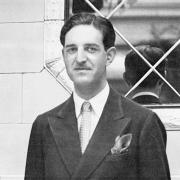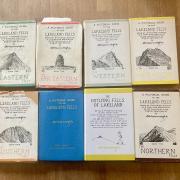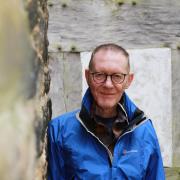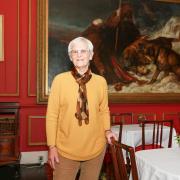Steve Tatlock grew up in urban Lancashire but his role as Windermere ranger makes him the envy of millions of visitors. He talks to Karen Barden
A tranquil Tuesday and the guy whose job was recently voted the second coolest outdoor career in the country watches boats glide across sun-dappled Windermere.
Originally from Horwich - the Lancashire town once famed for hosting British Rail’s biggest repair yard - Steve Tatlock’s urban roots have long been severed, replaced by a rural role coveted by millions.
He is custodian of England’s longest lake, the Lake District National Park ranger charged with protecting the 10.5 mile stretch of water and honey-pot villages of Bowness and Windermere.
Over half of the area’s 8.3 million visitors pass through his patch, but Steve, who also teaches tai chi, rarely bows to pressure. When he applied for his job 20 years ago there were 600 applicants. Hardly surprising, then, that a national outdoor magazine voted it number two in a ‘cool rating’ job survey.
There have been TV appearances; he’s been a badge wearing Blue Peter guest and Bill Bryson’s classic Notes from a Small Island includes an interview with the straight talking Lancashire jack-of-all-trades. And those in the know say this modest man is master of many.
Steve walks a fine line between ambassador and anchorman, conservationist and cleaner, protector and policeman. Every ounce of his diplomatic skills are regularly called upon.
‘I came here for five years, but now know I’ll never leave,’ he says. His Lakes’ love affair started when he was a boy. The anticipation and awe coming over Bannerigg and seeing the lake laid out before him is as powerful now as it was then.
‘The wow factor is the Lake District, it draws you in, envelops and enthrals. Our family holidays here were wonderful. That it’s home to my two boys means the legacy continues.’
From his shoreline office he looks out on to a picture postcard scene. It’s a quiet weekday bathed in early summer sun, yet gentle lapping water and glorious surroundings mask a mire of murky and ever challenging conditions.
Litter, oil spills, disappearing reedbeds, threatened habitats, declining species are ever recurring and worrying themes.
Steve sees one of his major roles as an educator. This summer he’ll once again be on the lake steamers, his soapbox upper deck position allowing three-hour long, loud speaker enhanced spiels. His passion for the place is infectious.
From compelling history - the Romans loved it and Windermere’s unique char fish, once so revered, they were transported to London by express train and served at the finest restaurants - to 21st century pressures, it’s all there.
‘Getting people to care is our goal. Enjoyment is paramount too, because ultimately we will only be concerned for the things we value most,’ he explains.
‘Even our annual Winderclean events can have their moments, like the year we found a lot of discarded ladies’ lingerie around the shoreline. It followed the last hot summer! Not that rubbish is ever a laughing matter.’
Flotsam and jetsam apart, there have been angry storms and the current calm waters belie the furore following the imposition of a 10 nautical miles an hour speed limit five years ago.
The controversial byelaws were made in 2000, following an intense six week public inquiry, but not enforced until 2005.
Steve explained: ‘Even when the speed limit was announced, there was disbelief among the water skiers and power boating fraternity. Many thought it would be overturned and that it was a phoney law.’
They were difficult times. Steve, often the scapegoat, bore the brunt of the anger. He was assaulted - although he shrugs it off as ‘more of a playground scuffle’ - and had protestors lining up outside his home.
‘I don’t mind being the public face of Windermere, but my private life is just that, and to have my family put under pressure was disturbing to say the least.
‘We’ve had a couple of dozen prosecutions so far, but in every sense, it’s calmer. Peace has returned, there’s serenity and in a different way, it’s busy and bustling.’
At its height in the 1980s, power boating saw 12,000 vessels on the lake, often big money, big engine, big noise machines. Now there 4,500 registered boats, of all types.
‘Perceptions and aspirations have changed,’ says Steve. ‘It’s a safer and more welcoming place. New businesses have cropped up. We’ve far more sailing boats, canoes, rowing boats. Even � swimming has taken off in a big way.
‘The really bad times, the horrendous near misses and injuries - no driving tests, or insurance needed for power boats - are hopefully consigned to the history books.’
These days Steve is more concerned about swimmers’ safety; black wetsuited and skull capped front crawlers are not always easy to see from a boat.
‘We’re all going to have to keep a careful watch. But it’s fantastic to see so many plunging in, especially for the Great North Swim, which we host. We’re expecting around 8,000 entries this year.’
It’s all a far cry from his early ambition to be a graphic designer, foiled because his grammar school art teacher said he wasn’t up to it. Following his father’s footsteps wasn’t an option either.
He never knew exactly what his late dad did. It was top secret. Something to do with British Aerospace thermal imaging he thinks. His mother, a senior clerk with the Independent Broadcasting Authority, obviously installed a confidence and flair for dealing with media.
After clinching a one in 40 chance of studying countryside and recreation management in Surrey, he’s always held ranger posts. His first was in the Tame Valley, including Saddleworth Moors, where he met his wife, Kathryn. She was his boss.
At his Lake District interview, he was asked for a masterplan. ‘Create a huge car park at Junction 36 and operate a park and ride scheme, I suggested to sharp intakes of breath. Now everyone is saying it’s a good idea!’
The Lake District has 12 rangers, the eyes, ears and disciples of the national park, whose work goes well beyond any job description.
‘I rescued an old lady during the floods. She threw her arms around my neck, kissed and thanked me. Rescue is not part of my job, but making a difference is.
‘It’s a big turn around from the height of the speed limit protests, when I was described as the most miserable man in the Lake District!’


























